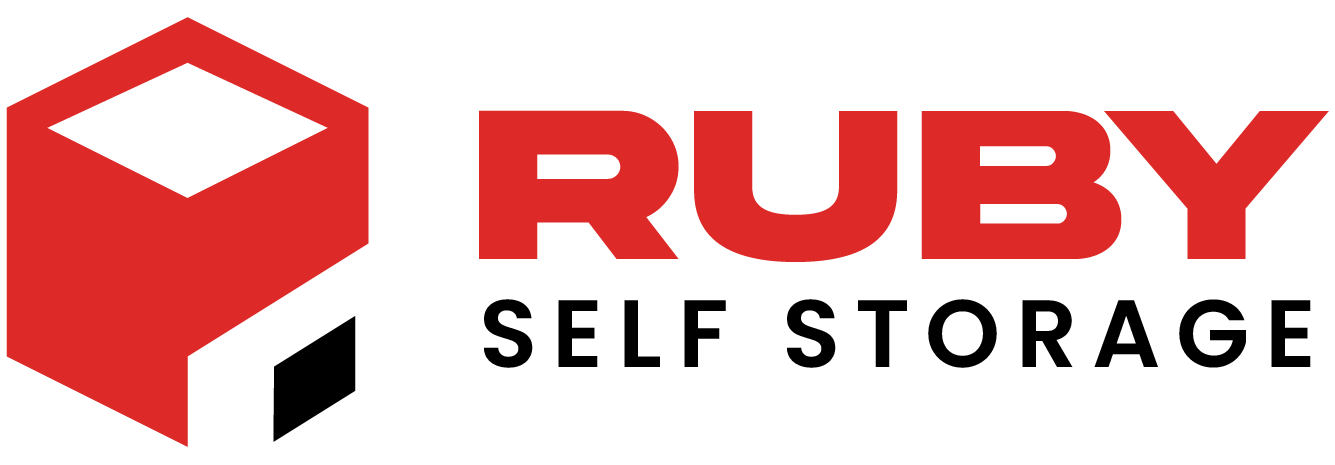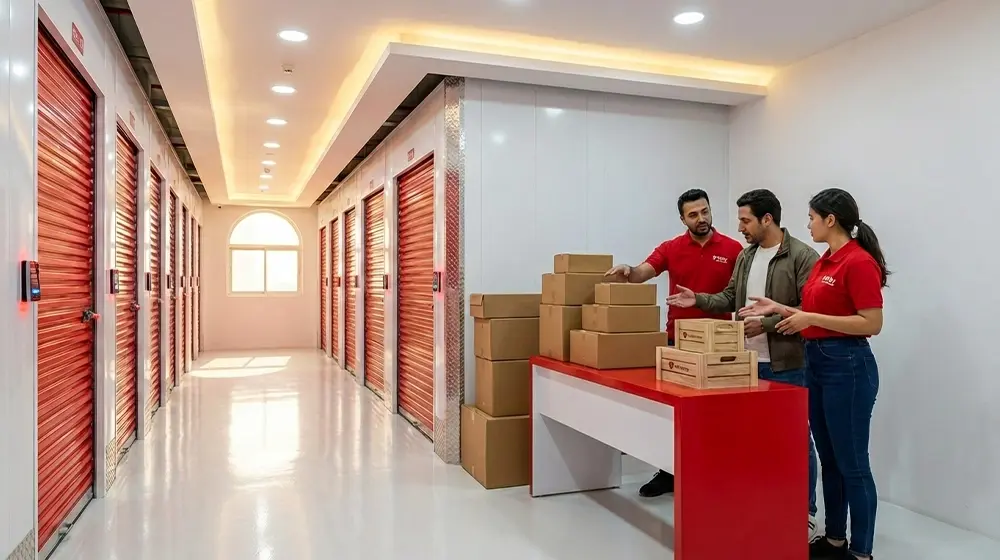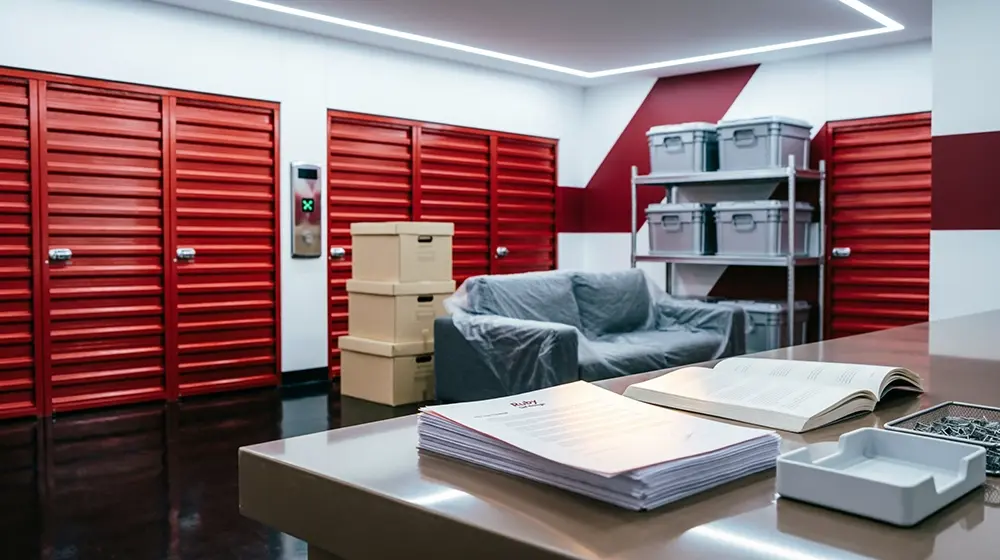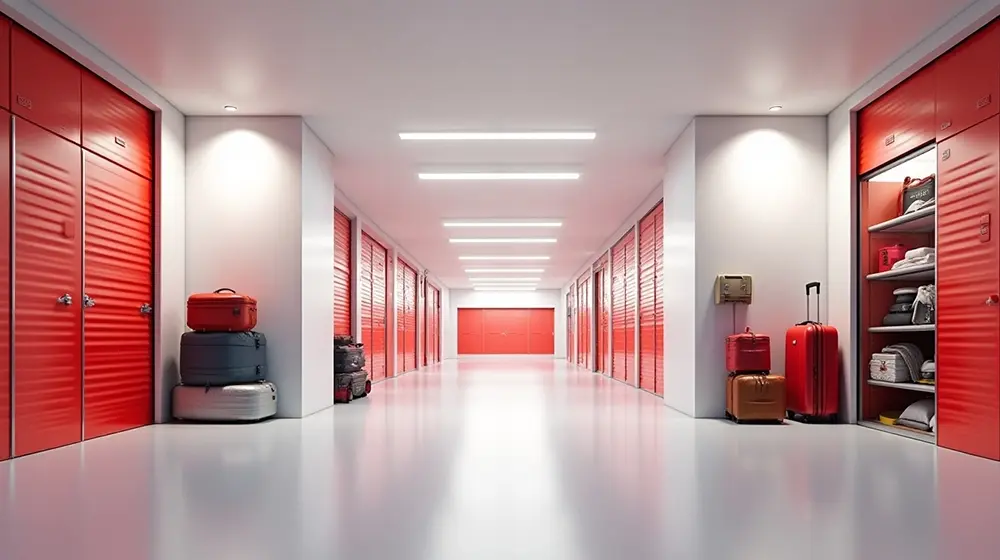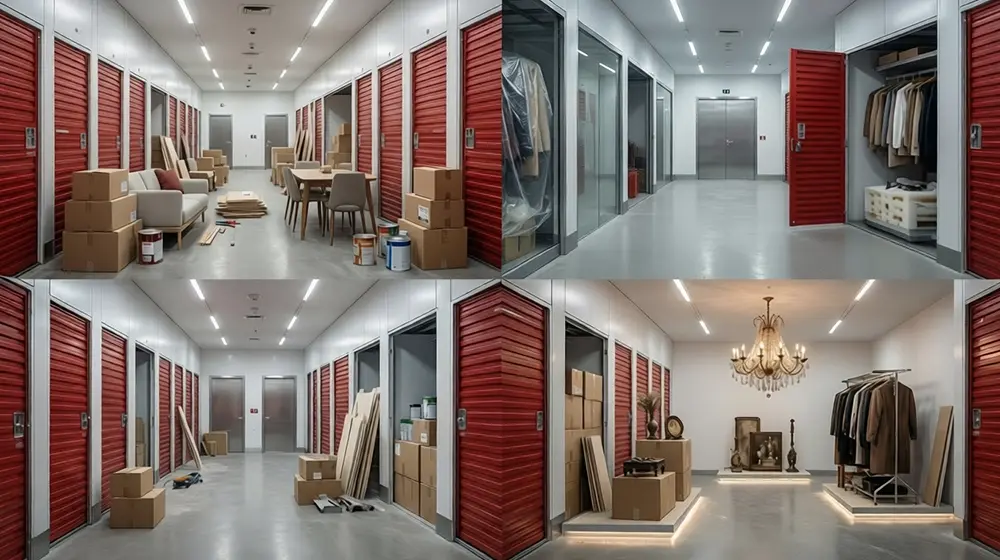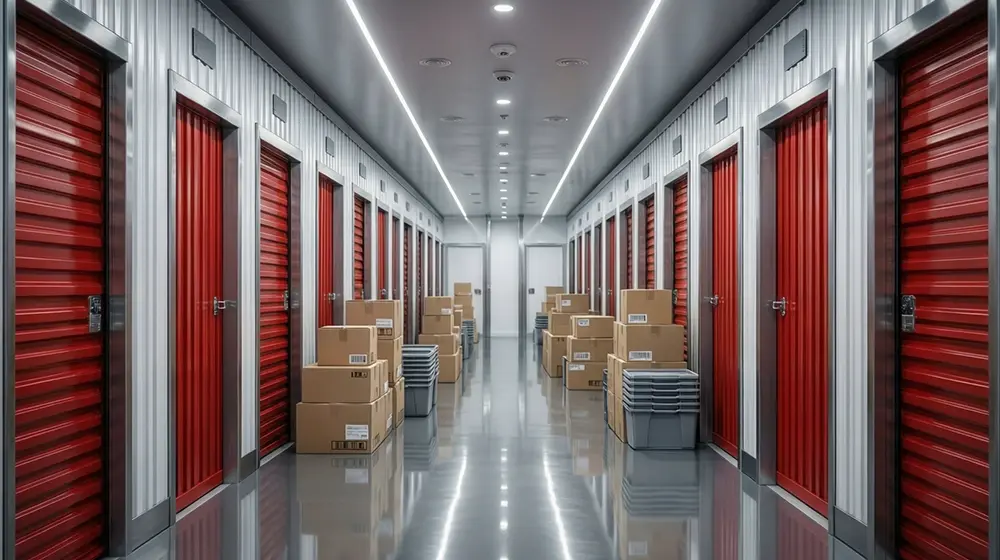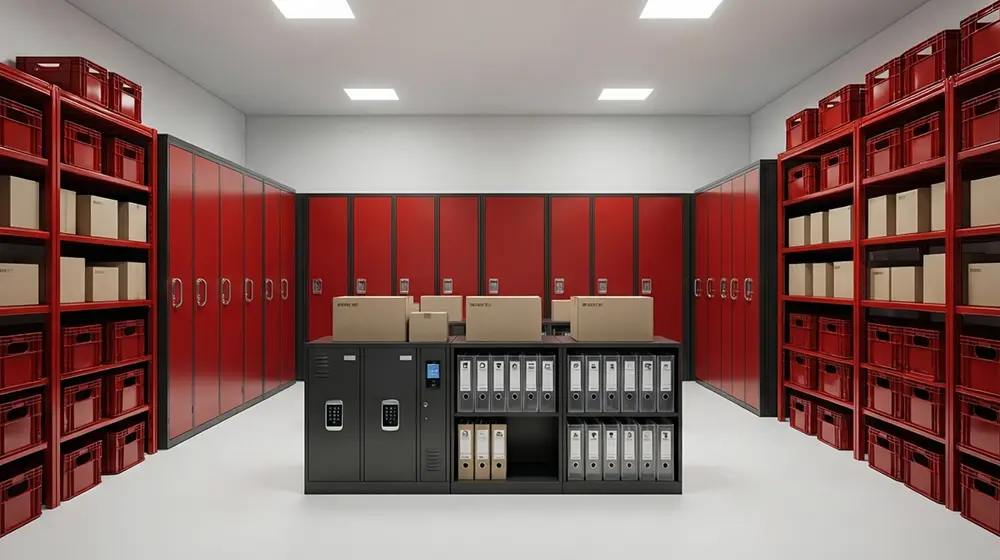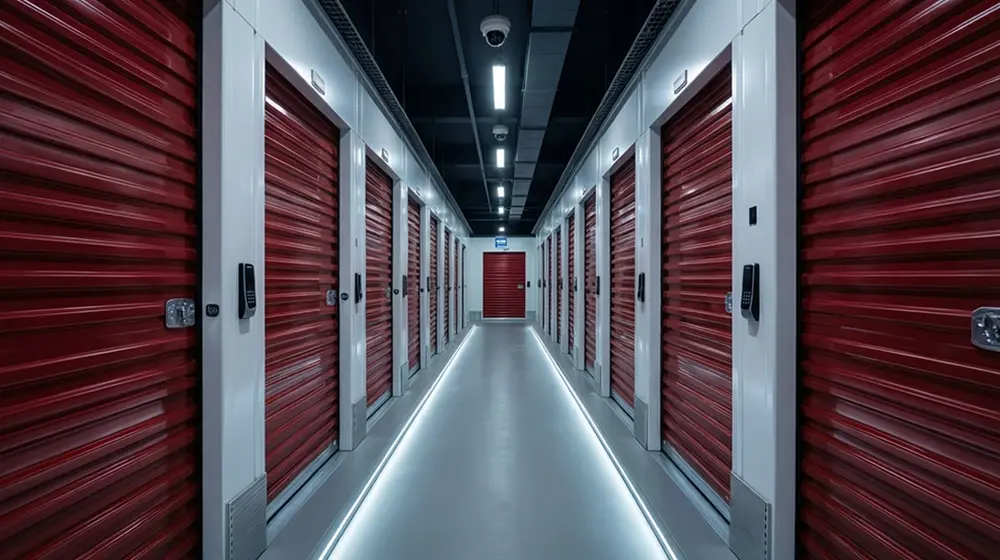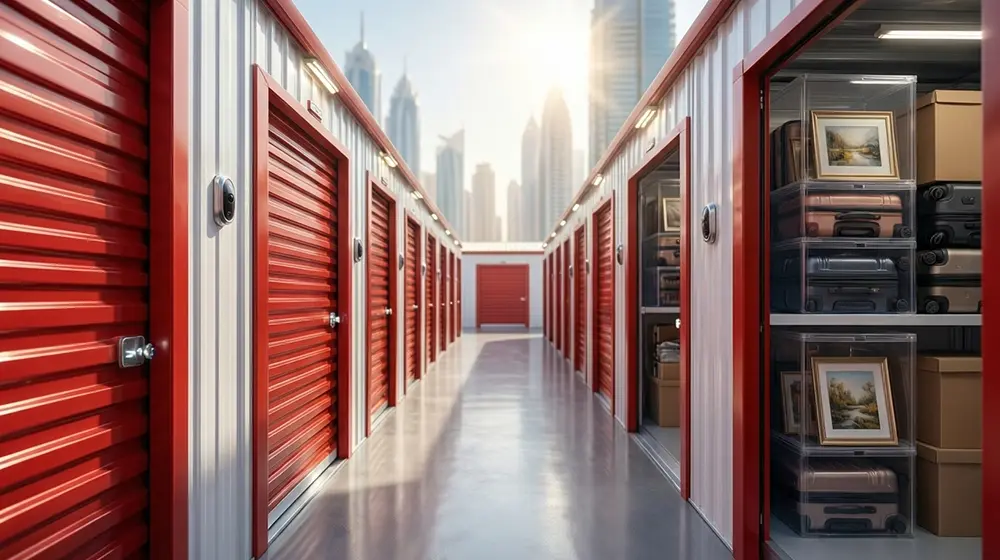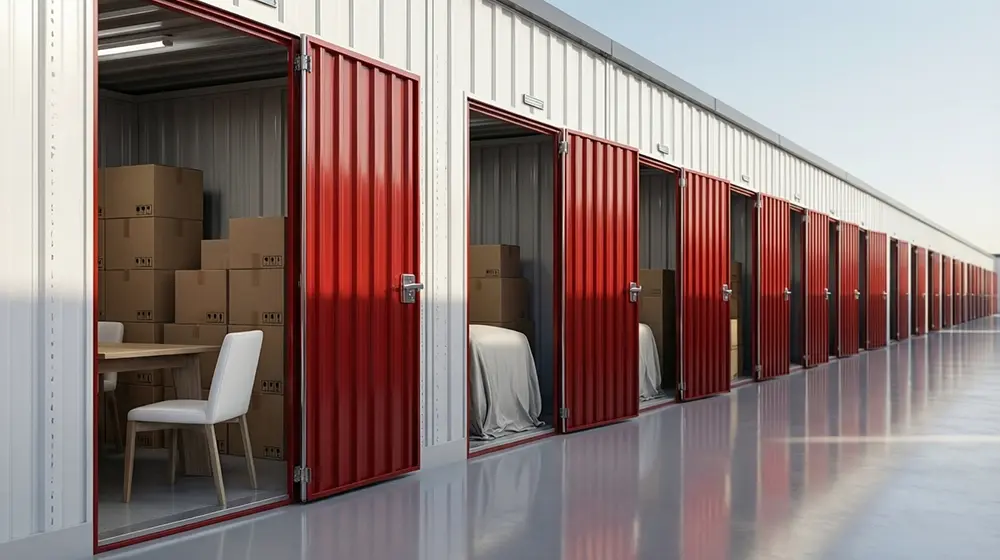In Dubai’s fast-growing property market, the choice between self storage units and renting a room is becoming increasingly relevant. Rising rents, lifestyle changes, and the growth of the storage industry have forced students, expats, and small businesses to compare these two options. The key difference is clear: self storage is designed for belongings, while a rented room is for living.
This guide provides data-driven comparisons, legal insights, and practical examples tailored for Dubai residents. You will learn which option saves money, offers more space, and provides better flexibility.
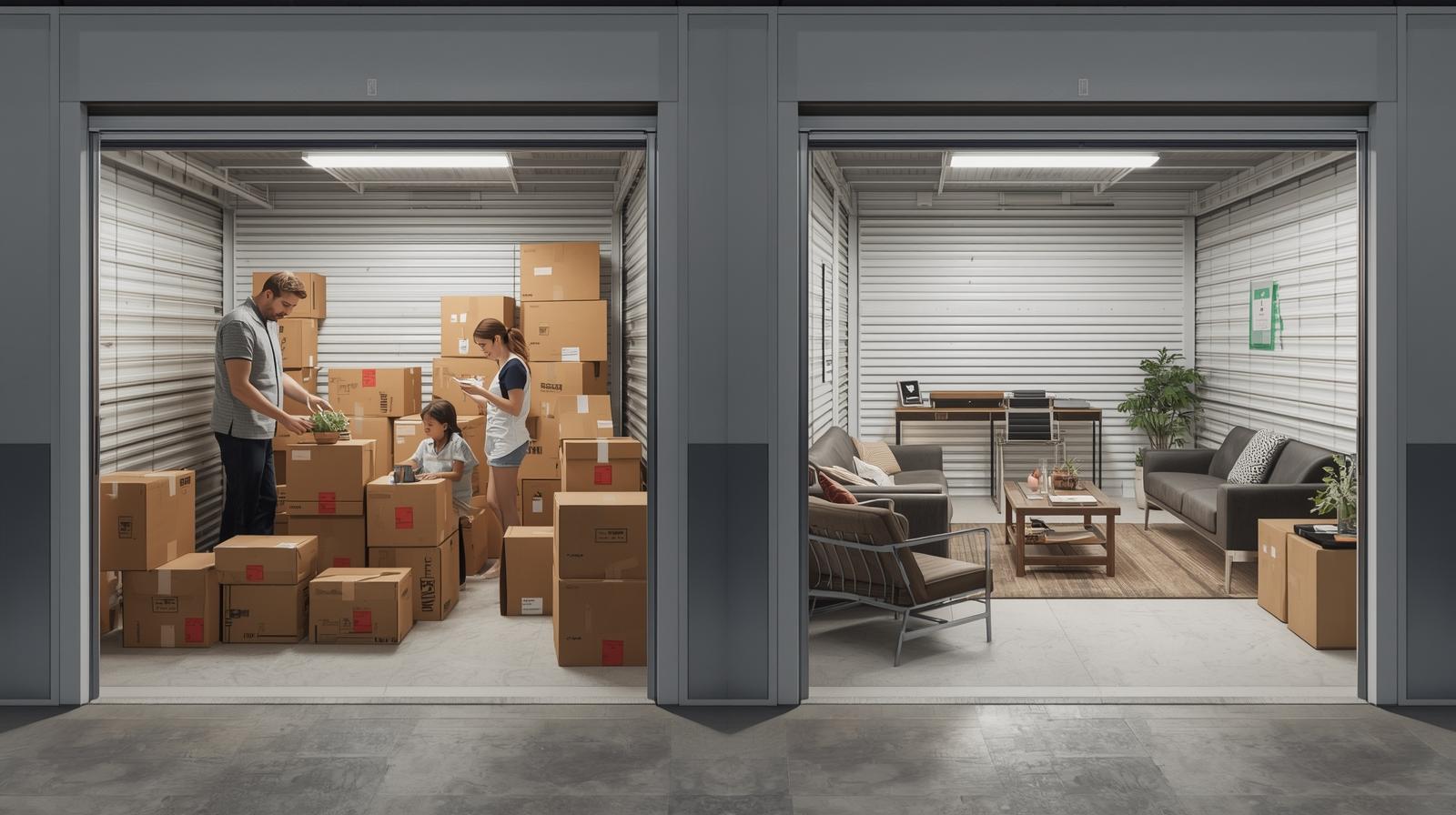
Which Option Costs Less per Square Foot in Dubai?
Self storage in Dubai costs AED 40–70 per sq ft per year, while renting a room in central areas typically costs AED 2,500–5,000 per month (equivalent to AED 250–400 per sq ft per year).
Current Average Costs in Dubai
Self storage (25–50 sq ft units):
- AED 400–800 per month.
Room rental in shared apartments:
- Deira / Bur Dubai: AED 2,000–3,000 per month.
- Al Barsha / JLT: AED 3,000–4,000 per month.
- Downtown Dubai / Marina: AED 4,000–5,000+ per month.
Square Footage Assumptions
- Storage unit: Defined, e.g., 50 sq ft = AED 600 per month average.
- Room size: Typical bedroom = 100–120 sq ft.
Cost-per-Square-Foot Calculations (AED)
- Storage: AED 600 ÷ 50 sq ft = AED 12/sq ft per month (~AED 144/sq ft annually).
- Room rental (avg AED 3,500, 120 sq ft): AED 29/sq ft per month (~AED 348/sq ft annually).
Cost per Square Foot Comparison
| Market | Avg Monthly Rent | Room/Unit Size | AED per sq ft (Monthly) | AED per sq ft (Annually) |
|---|---|---|---|---|
| Self Storage (avg) | AED 600 | 50 sq ft | AED 12 | AED 144 |
| Shared Room (avg) | AED 3,500 | 120 sq ft | AED 29 | AED 348 |
| Marina/Downtown | AED 5,000 | 120 sq ft | AED 41 | AED 492 |
Verdict on Costs in Dubai
Self storage is 70–80% cheaper than renting a room when measured by space alone. Renting a room, however, includes utilities, legal address, and habitation rights under Dubai’s RERA tenancy law.
How Much Space Do You Get in Dubai?
A 50 sq ft storage unit can hold the contents of a studio apartment, while a rented bedroom must balance furniture with personal belongings.
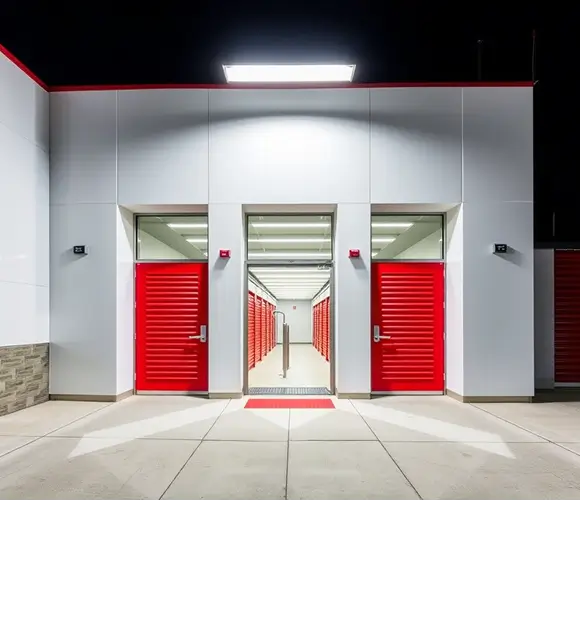
Storage Unit Capacity in Dubai
- 25 sq ft (AED 400/month): Boxes, seasonal items, small appliances.
- 50 sq ft (AED 600–800/month): Contents of a studio or small 1-bedroom.
- 100+ sq ft (AED 1,200+/month): Furniture from a full apartment
Rented Room Capacity in Dubai
- Minimum habitable size: ~70 sq ft as per Dubai Municipality housing guidelines.
- Typical size in shared flats: 100–120 sq ft.
- Practical use: Bed (20–25 sq ft), wardrobe (10–15 sq ft), desk (15 sq ft), leaving ~50 sq ft free.
Usability of Space
- Storage unit: 100% available for belongings; vertical stacking allowed.
- Room rental: Space divided between living, furniture, and belongings; only 40–50% usable for storage.
Space Utilization in Dubai
| Size | Storage Unit Capacity | Rented Room Capacity |
|---|---|---|
| 25 sq ft | 10–15 boxes, luggage, seasonal gear | Too small for living |
| 50 sq ft | Studio apartment contents | Bed + wardrobe only |
| 100 sq ft | 1–2 bedroom apartment contents | Typical Dubai bedroom with limited storage |
What Lease Terms and Flexibility Do You Get in Dubai?
Self storage in Dubai is usually month-to-month, while most room leases are annual (12 months) and registered with Ejari under RERA.
Storage Lease Terms in Dubai
- Standard contracts: Month-to-month or quarterly agreements.
- Cancellation: Usually requires 7–14 days’ notice; some allow same-day exit with no penalties.
- Access: Many facilities provide 24/7 access, while some are restricted to business hours.
Room Rental Lease Terms in Dubai
- Ejari registration: Mandatory for most formal leases in Dubai.
- Common duration: 12 months, renewable annually.
- Short-term options: Sublets or shared rooms may allow monthly contracts, but usually at a higher rate.
- Early termination: The Landlord can impose penalties or keep part of the deposit.
Flexibility Impact
- Storage units: Ideal for temporary residents, students, or people relocating. Cancel anytime without a long commitment.
- Room rentals: Offer security for long-term tenants but lock you into annual leases.
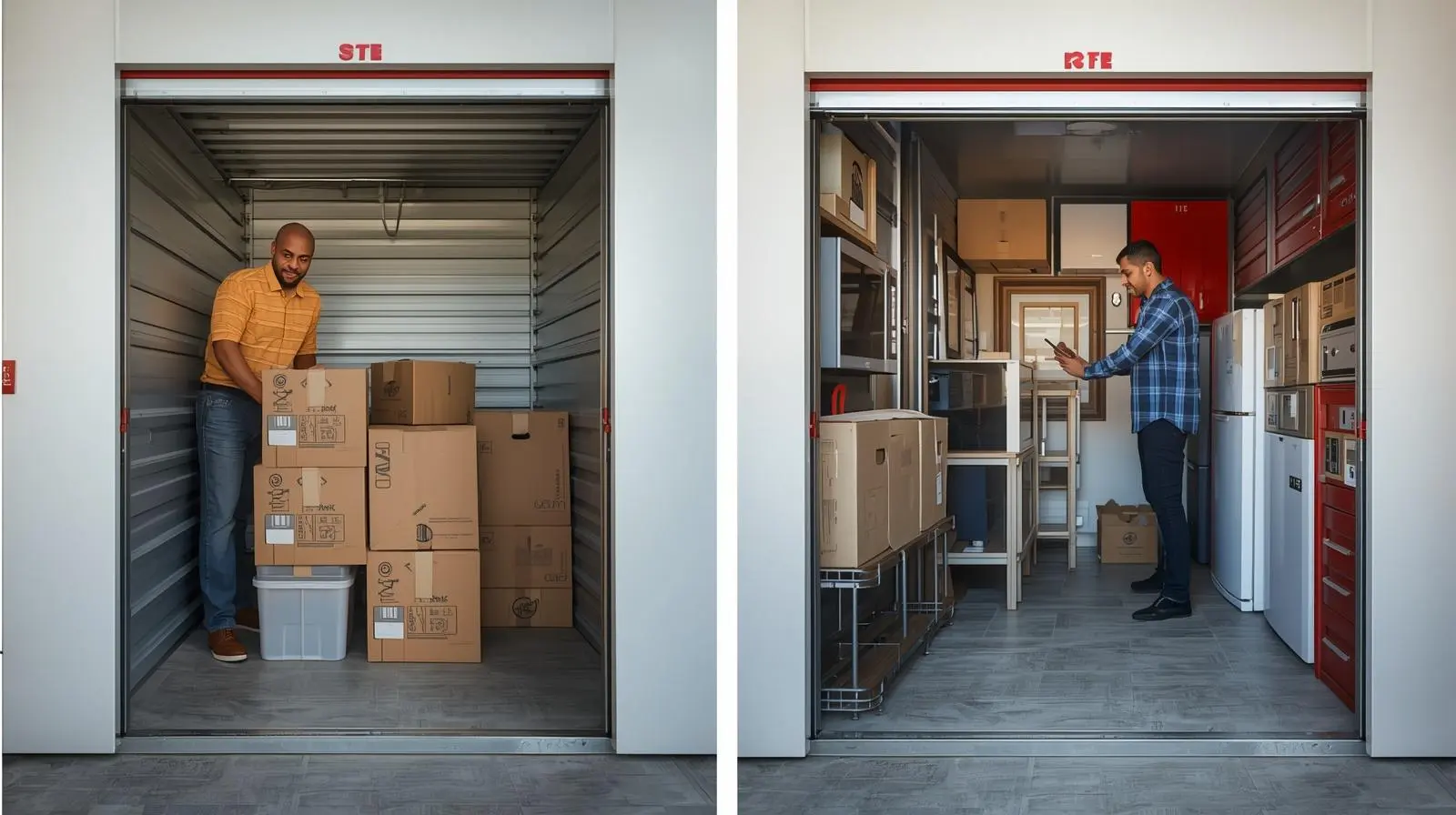
What Hidden Costs Exist in Self Storage vs Renting a Room in Dubai?
Advertised prices rarely show the complete financial picture. Dubai residents must consider hidden charges in both storage facilities and tenancy agreements. Self storage adds insurance and climate-control surcharges, while renting a room adds deposits, DEWA bills, and Ejari fees.
Hidden Costs in Self Storage Dubai
- Insurance: Some facilities require insurance (~AED 30–80/month).
- Admin/setup fee: AED 50–100 one-time charge at move-in.
- Climate-controlled units: Premium of 15–30% over basic storage.
- Lock purchase: AED 40–70 upfront.
Hidden Costs in Renting a Room in Dubai
- Security deposit: Usually 5% of annual rent for unfurnished, 10% for furnished apartments. For rooms, typically AED 1,000–3,000 depending on the landlord.
- DEWA (utilities): AED 300–800/month depending on usage and sharing.
- Chiller fees: Some towers charge cooling separately (AED 200–500/month).
- Ejari registration: Mandatory fee of AED 220 for contract registration.
- Agency commission: If using an agent, 5% of annual rent or AED 5,000 minimum.
- Renter’s insurance: Optional but recommended (~AED 30–50/month).
Hidden Cost Breakdown in Dubai
| Cost Type | Self Storage (Dubai) | Renting a Room (Dubai) |
|---|---|---|
| Insurance | AED 30–80/month | AED 30–50/month (optional) |
| Deposit | None or minimal | AED 1,000–3,000 (room), 5–10% (lease) |
| Admin/Application | AED 50–100 one-time | Ejari AED 220 + agency commission |
| Utilities (DEWA) | N/A | AED 300–800/month |
| Climate Control | +15–30% premium | Included in DEWA / chiller bills |
| Lock purchase | AED 40–70 upfront | Not applicable |
Conclusion: Storage is cheaper short-term; rooms are costly upfront, but cover habitation rights.
What Legal Rules Apply to Storage vs Room Rentals in Dubai?
Renting a room in Dubai is legally recognized under RERA tenancy laws, while living in a storage unit is strictly illegal under Dubai Municipality regulations and facility contracts.
Why You Cannot Live in a Storage Unit in Dubai
- Dubai Municipality codes: Habitable spaces must meet minimum requirements for lighting, ventilation, sanitation, and safety. Storage units fail these standards.
- Fire & safety laws: Units lack fire exits, HVAC, plumbing, and emergency systems required for dwellings.
- Facility contracts: All major providers explicitly prohibit using storage units for residential purposes.
Tenant Rights in Renting a Room in Dubai
- Governed by Dubai’s Tenancy Law No. 26 of 2007 and amendments.
- All formal leases must be registered through Ejari.
- Protections include:
- Deposit return rules (landlords must return deposits if no damages).
- Notice before eviction (90 days unless agreed otherwise).
- Right to habitable space with essential utilities.
Storage Contract vs Room Lease in Dubai
- Storage contract: Usually 1–2 pages, covering rent, insurance, late fees, and termination.
- Room lease: Multi-page, covering rent, utilities, maintenance, subletting, termination, and tenant rights. Ejari registration is mandatory.
Legal Differences
| Aspect | Self Storage in Dubai | Renting a Room in Dubai |
|---|---|---|
| Habitation allowed | Not allowed | Legal under RERA |
| Governing law | Facility contract | Dubai Tenancy Law + RERA regulations |
| Minimum space | Not applicable | ~70 sq ft per Dubai Municipality housing |
| Eviction process | Contract termination | Court-based eviction under RERA rules |
| Paperwork length | 1–2 pages | Ejari-registered lease (10+ pages) |
Verdict on Legal Rules in Dubai
Storage is only for belongings. Renting a room gives tenants legal protections, habitation rights, and regulated tenancy under RERA.
Which Option Offers Better Security in Dubai?
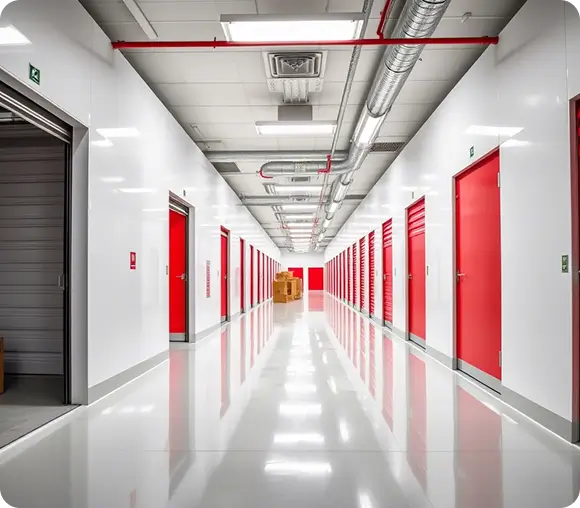
Self storage facilities in Dubai offer strong physical security, while rented rooms depend on the building’s management and neighborhood safety.
Storage Facility Security in Dubai
- 24/7 CCTV monitoring throughout facilities.
- Access control, PIN, card, or biometric entry.
- Tamper-proof locks and individual alarms in some premium facilities.
- On-site managers often present during working hours.
Room Rental Security in Dubai
- Locks: Standard apartment locks, dependent on landlord/building.
- Concierge/security guards: Most Dubai towers (Marina, Downtown, JLT) have lobby security and access cards.
- Neighborhood impact: Older areas (Deira, Satwa) may have fewer building-level protections compared to newer gated communities.
Disaster and Emergency Risks in Dubai
- Storage units: Vulnerable to facility-wide risks like fire, though many modern facilities follow Dubai Civil Defence safety standards.
- Rooms in residential buildings: Covered by mandatory fire alarm and suppression systems under Dubai Municipality rules.
Security Comparison
| Feature | Self Storage in Dubai | Renting a Room in Dubai |
|---|---|---|
| CCTV | Standard in all modern facilities | Common in towers, less in older flats |
| Access control | PIN/biometric + gated entry | Key/card access depending on the building |
| On-site manager | Common in premium facilities | Not standard, depends on property type |
| Burglary risk | Lower (private unit) | Higher (shared spaces, roommates) |
| Shared access | None (private unit) | Yes (flatmates, landlords, maintenance) |
Verdict on Security in Dubai
Self storage generally provides superior security infrastructure for belongings. Rented rooms offer reasonable residential security, but risks vary by neighborhood and landlord quality.
Who Benefits More from Self Storage vs Renting a Room in Dubai?
In Dubai, students, expats, frequent travelers, and small businesses benefit most from self storage, while long-term residents and full-time workers benefit more from renting a room.
Students in Dubai
- Many international students in Dubai (e.g., at the University of Dubai, AUD, Middlesex) return home during the summer.
- Instead of paying AED 2,500+ monthly for a room, they store belongings in a 50 sq ft unit for ~AED 600/month.
- Example: Storing items for 3 months = AED 1,800 vs AED 7,500 in rent → ~75% savings.
Digital Nomads & Frequent Travelers
- Dubai is a hub for remote workers with frequent travel schedules.
- A storage unit costs AED 500–700/month, much cheaper than maintaining a room at AED 3,000–4,000/month while abroad.
- Nomads often use storage near DXB or Al Quoz for convenience.
Small Businesses & E-commerce Sellers
- SMEs and e-commerce sellers use storage to hold inventory.
- Renting a small office/store room in Dubai Business Bay can exceed AED 5,000/month.
- Storage units in Al Quoz or DIP offer ~200 sq ft for AED 1,800/month, saving 60–70%.
Long-Term Tenants and Workers
- For full-time Dubai residents, renting a room is essential.
- Rooms provide legal housing, DEWA utilities, and a registered Ejari tenancy contract.
- Storage cannot replace habitation.
Who Benefits More?
- Self Storage Dubai: Students, digital nomads, frequent travelers, e-commerce businesses.
- Room Rentals Dubai: Long-term tenants, employees needing legal housing, and families.

Do Regional Price Gaps Change the Cost Balance in Dubai?
Yes, the location in Dubai significantly affects costs. Storage remains cheaper per sq ft across all areas, but room rental prices vary drastically between prime and suburban neighborhoods.
Average Prices in Dubai
- Self Storage (50 sq ft unit): AED 600–800/month depending on location
- Room Rentals:
1. Deira / Bur Dubai: AED 2,000–3,000/month.
2. Al Barsha / JLT: AED 3,000–4,000/month.
3. Downtown / Marina: AED 4,000–5,000+/month
Cost-per-Square-Foot Comparison (AED, Monthly)
| Location | Avg Room Rent | Room Size | AED/sq ft (Room) | Storage Unit (50 sq ft) | AED/sq ft (Storage) |
|---|---|---|---|---|---|
| Deira / Bur Dubai | AED 2,500 | 120 sq ft | AED 20.8 | AED 600 | AED 12 |
| Al Barsha / JLT | AED 3,500 | 120 sq ft | AED 29.1 | AED 650 | AED 13 |
| Marina / Downtown | AED 5,000 | 120 sq ft | AED 41.6 | AED 800 | AED 16 |
Verdict on Regional Price Gaps in Dubai
In prime areas (Marina, Downtown) → Self storage is up to 70% cheaper per sq ft than renting a room. In mid-range areas (Barsha, JLT) → Storage is still ~55% cheaper. In older districts (Deira, Bur Dubai) → Gap narrows but storage remains cheaper by ~40%.
Case Studies and Real-Life Examples in Dubai
Real-life cases illustrate how storage and renting compare in practical scenarios for Dubai residents.
Case Study: International Student at the University of Dubai
- Rent: AED 2,500/month for a shared room in Deira.
- Storage: AED 600/month for 50 sq ft during summer.
- Result: Saved AED 5,700 over 3 months by storing belongings instead of paying rent while away.
Case Study: Digital Nomad Based in Dubai Marina
- Works abroad for 4–6 months per year.
- Room rent: AED 4,000/month in Marina.
- Storage: AED 700/month in Al Quoz.
- Result: Saves AED 19,800 annually (AED 28,800 rent vs AED 8,400 storage).
Case Study: E-commerce Seller in Al Quoz
- Needs 200 sq ft for inventory.
- Room rental alternative: AED 3,500/month in a shared flat.
- Storage option: AED 1,800/month for a 200 sq ft unit.
- Result: 48% savings and dedicated secure storage.
Case Study: Long-Term Tenant in Bur Dubai
- Needs legal address, DEWA utilities, and permanent residence.
- Storage cannot replace tenancy.
- Result: Renting a room remains necessary.
Key Takeaway:
- Students & travelers: Storage saves significant money.
- Digital nomads & businesses: Storage = flexibility + lower costs.
- Long-term residents: Renting a room remains essential.
Short-Term vs Long-Term Verdict in Dubai
The better choice depends on how long you need the space. In Dubai, there is an economic shift between short-term and long-term use. Storage is superior for short-term needs, while room rentals dominate for long-term housing.
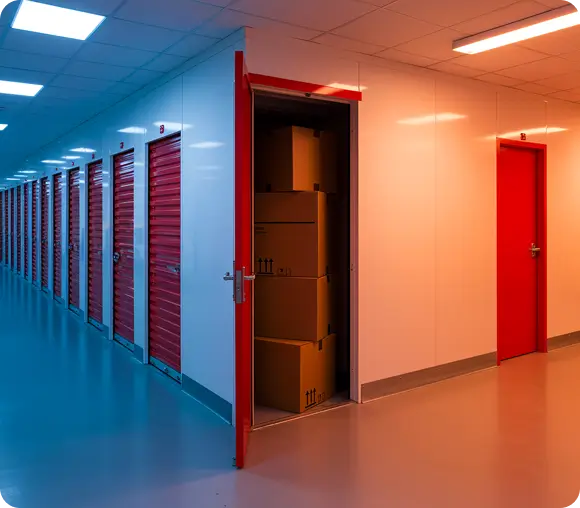
Short-Term (1–6 months)
- Storage: Saves 70–80% compared to renting a room.
- Best users: Students on summer break, digital nomads, seasonal workers, and tourists.
- Example: AED 1,800 for 3 months storage vs AED 9,000 for a room = 80% savings.
Long-Term (12+ months)
- Room rentals: Provide DEWA utilities, Ejari legal registration, and a permanent address.
- Storage only: Cannot replace legal residence, becomes an extra cost.
- Verdict: Storage complements long-term living but does not substitute for tenancy.
Key Insight for Dubai Residents:
Short-term expats, students, nomads, and SMEs → Self storage is the smarter option.
Long-term residents needing housing and utilities → Renting a room remains essential.
Comparison Matrix: Self Storage vs Renting a Room in Dubai
A direct comparison highlights differences clearly. Each factor shows whether self storage or renting a room is the better option in Dubai. Self storage wins in cost, flexibility, and security, while renting wins in habitation, utilities, and tenancy rights.
| Factor | Self Storage (Dubai) | Renting a Room (Dubai) |
|---|---|---|
| Average cost (per month) | AED 600–2,500 (unit size dependent) | AED 2,500–4,500 (shared room) |
| Cost per sq ft | ~AED 6–10 | AED 25–40 |
| Lease terms | Month-to-month | Usually 12 months (Ejari registered) |
| Legal habitation | Not allowed | Fully legal |
| Hidden costs | Insurance, admin fees | Deposit (1–2 months), DEWA, internet |
| Security | CCTV, access codes, guards | Standard locks, landlord-controlled |
| Space usability | 100% belongings | Split between furniture + belongings |
| Flexibility | High (scalable, cancel anytime) | Low (fixed leases, penalties) |
| Ideal users | Students, expats, SMEs, travelers | Tenants, workers, long-term residents |
Conclusion: Self Storage vs Renting a Room in Dubai
The debate between self storage in Dubai and renting a room in Dubai depends on purpose, cost, and duration.
Self storage in Dubai offers affordable, flexible, and secure solutions for students, digital nomads, and small businesses. With average costs between AED 600 and 2,500/month, storage units are 70–80% cheaper per square foot than room rentals. Renting a room in Dubai, priced at AED 2,500–4,500/month, provides legal housing, DEWA utilities, and permanent residence rights. While more expensive, it remains essential for long-term tenants and workers who require a legal address under the Ejari tenancy laws.
- Choose Self Storage in Dubai if you need short-term, flexible, and cost-effective storage for belongings.
- Choose Renting a Room in Dubai if you need long-term housing, utilities, and legal tenancy.
Both options serve different needs. The best decision comes from calculating your cost per square foot, factoring in hidden costs, and considering your duration of stay in Dubai.
Frequently Asked Questions (FAQs): Self Storage vs Renting a Room in Dubai
Is self storage in Dubai cheaper than renting a room?
Yes. Self storage costs around AED 600–2,500/month, while renting a room averages AED 2,500–4,500/month.
Can you legally live in a storage unit in Dubai?
No. Storage units are not legal residences under the Dubai Municipality and Ejari regulations.
How much does a storage unit cost in Dubai?
A 50–150 sq ft storage unit in Dubai typically costs AED 600–1,800/month, depending on size and location.
What are the hidden costs of renting a room in Dubai?
Room rentals often require a 1–2 months’ deposit, DEWA bills, and internet fees, which add AED 500–1,000/month.
Are storage facilities in Dubai secure?
Yes. Facilities offer CCTV, access codes, and 24/7 security guards, especially in Al Quoz, JLT, and DIP.
Who benefits most from self storage in Dubai?
Students, digital nomads, small businesses, and short-term expats save the most by choosing storage.
Does self storage in Dubai require insurance?
Yes. Many providers require basic insurance, costing about AED 30–100/month depending on coverage.
How flexible are Dubai storage contracts?
Most storage units operate on a month-to-month basis, unlike 12-month Ejari leases for room rentals.
What is the cost per square foot difference in Dubai?
Storage = AED 6–10/sq ft
Rooms = AED 25–40/sq ft
Should I rent a room or use self storage in Dubai if I’m relocating?
If relocating temporarily, storage is the cheaper choice. If staying long-term, renting a room with Ejari is necessary.
Rakan Al-Juraid is a logistics specialist with a focus on commercial storage systems and high-security asset management. With extensive experience in industrial warehousing, he specializes in inventory tracking technology and transit safety. Rakan’s expertise lies in streamlining the storage process for both businesses and homeowners through strategic planning. His writing offers data-driven advice on insurance for stored goods, fire-safe environments, and heavy-duty logistics. He is committed to ensuring that every square foot of storage is utilized with maximum security and efficiency. Rakan aims to provide professional-grade storage standards to every reader navigating the moving process.
Layali Al-Samer is a seasoned storage and organization expert with over 12 years of experience in the logistics industry. She holds a degree in Spatial Design, specializing in high-density residential storage and climate-control solutions. Layali focuses on inventory management for luxury goods and long-term preservation techniques for sensitive heirlooms. Her articles provide expert guidance on maximizing unit efficiency and protecting valuables from environmental damage. She is dedicated to helping readers declutter their lives through strategic and organized spatial planning. Layali’s goal is to ensure every possession is stored with the highest level of care and precision.
- This author does not have any more posts
